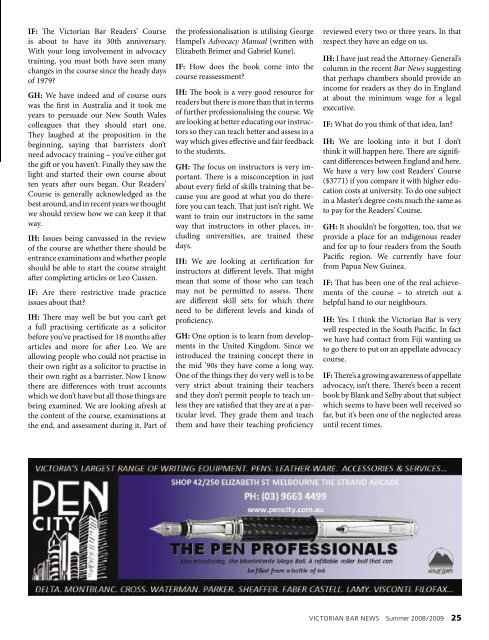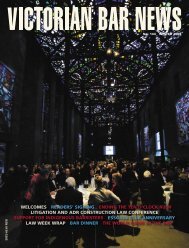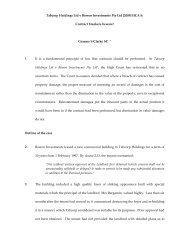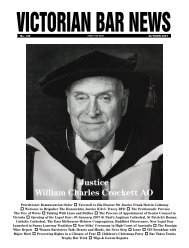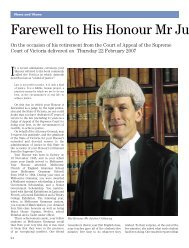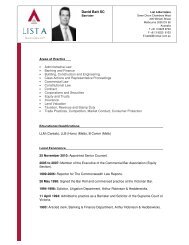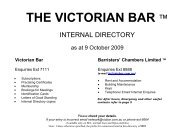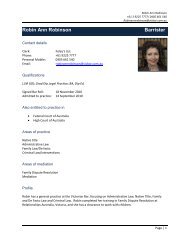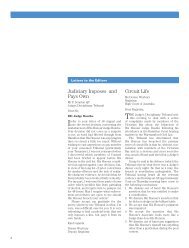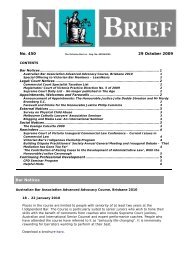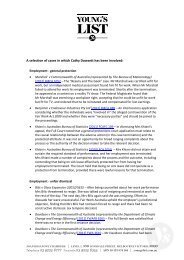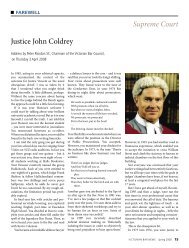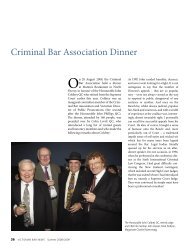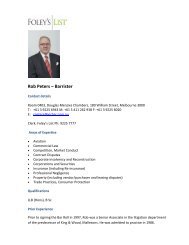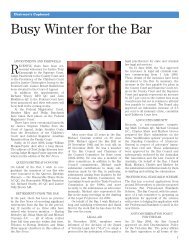Readers' Course revisited - Victorian Bar
Readers' Course revisited - Victorian Bar
Readers' Course revisited - Victorian Bar
Create successful ePaper yourself
Turn your PDF publications into a flip-book with our unique Google optimized e-Paper software.
IF: The <strong>Victorian</strong> <strong>Bar</strong> Readers’ <strong>Course</strong><br />
is about to have its 30th anniversary.<br />
With your long involvement in advocacy<br />
training, you must both have seen many<br />
changes in the course since the heady days<br />
of 1979?<br />
GH: We have indeed and of course ours<br />
was the first in Australia and it took me<br />
years to persuade our New South Wales<br />
colleagues that they should start one.<br />
They laughed at the proposition in the<br />
beginning, saying that barristers don’t<br />
need advocacy training – you’ve either got<br />
the gift or you haven’t. Finally they saw the<br />
light and started their own course about<br />
ten years after ours began. Our Readers’<br />
<strong>Course</strong> is generally acknowledged as the<br />
best around, and in recent years we thought<br />
we should review how we can keep it that<br />
way.<br />
IH: Issues being canvassed in the review<br />
of the course are whether there should be<br />
entrance examinations and whether people<br />
should be able to start the course straight<br />
after completing articles or Leo Cussen.<br />
IF: Are there restrictive trade practice<br />
issues about that?<br />
IH: There may well be but you can’t get<br />
a full practising certificate as a solicitor<br />
before you’ve practised for 18 months after<br />
articles and more for after Leo. We are<br />
allowing people who could not practise in<br />
their own right as a solicitor to practise in<br />
their own right as a barrister. Now I know<br />
there are differences with trust accounts<br />
which we don’t have but all those things are<br />
being examined. We are looking afresh at<br />
the content of the course, examinations at<br />
the end, and assessment during it. Part of<br />
the professionalisation is utilising George<br />
Hampel’s Advocacy Manual (written with<br />
Elizabeth Brimer and Gabriel Kune).<br />
IF: How does the book come into the<br />
course reassessment?<br />
IH: The book is a very good resource for<br />
readers but there is more than that in terms<br />
of further professionalising the course. We<br />
are looking at better educating our instructors<br />
so they can teach better and assess in a<br />
way which gives effective and fair feedback<br />
to the students.<br />
GH: The focus on instructors is very important.<br />
There is a misconception in just<br />
about every field of skills training that because<br />
you are good at what you do therefore<br />
you can teach. That just isn’t right. We<br />
want to train our instructors in the same<br />
way that instructors in other places, including<br />
universities, are trained these<br />
days.<br />
IH: We are looking at certification for<br />
instructors at different levels. That might<br />
mean that some of those who can teach<br />
may not be permitted to assess. There<br />
are different skill sets for which there<br />
need to be different levels and kinds of<br />
proficiency.<br />
GH: One option is to learn from developments<br />
in the United Kingdom. Since we<br />
introduced the training concept there in<br />
the mid ’90s they have come a long way.<br />
One of the things they do very well is to be<br />
very strict about training their teachers<br />
and they don’t permit people to teach unless<br />
they are satisfied that they are at a particular<br />
level. They grade them and teach<br />
them and have their teaching proficiency<br />
reviewed every two or three years. In that<br />
respect they have an edge on us.<br />
IH: I have just read the Attorney-General’s<br />
column in the recent <strong>Bar</strong> News suggesting<br />
that perhaps chambers should provide an<br />
income for readers as they do in England<br />
at about the minimum wage for a legal<br />
executive.<br />
IF: What do you think of that idea, Ian?<br />
IH: We are looking into it but I don’t<br />
think it will happen here. There are significant<br />
differences between England and here.<br />
We have a very low cost Readers’ <strong>Course</strong><br />
($3771) if you compare it with higher education<br />
costs at university. To do one subject<br />
in a Master’s degree costs much the same as<br />
to pay for the Readers’ <strong>Course</strong>.<br />
GH: It shouldn’t be forgotten, too, that we<br />
provide a place for an indigenous reader<br />
and for up to four readers from the South<br />
Pacific region. We currently have four<br />
from Papua New Guinea.<br />
IF: That has been one of the real achievements<br />
of the course – to stretch out a<br />
helpful hand to our neighbours.<br />
IH: Yes. I think the <strong>Victorian</strong> <strong>Bar</strong> is very<br />
well respected in the South Pacific. In fact<br />
we have had contact from Fiji wanting us<br />
to go there to put on an appellate advocacy<br />
course.<br />
IF: There’s a growing awareness of appellate<br />
advocacy, isn’t there. There’s been a recent<br />
book by Blank and Selby about that subject<br />
which seems to have been well received so<br />
far, but it’s been one of the neglected areas<br />
until recent times.<br />
VICTORIAN BAR NEWS Summer 2008 / 2009 25


